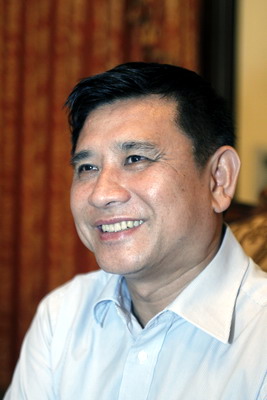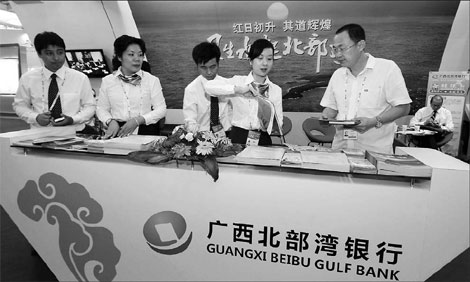Banks lured by ASEAN trade
Updated: 2011-11-04 13:47
By Bao Chang (China Daily)
|
|||||||||||
|
A booth of Guangxi Beibu Gulf Bank at 8th China ASEAN Expo . "Southeast Asian countries are the key areas where Chinese banks will strengthen their efforts to expand," said Guo Tianyong, director of the China Banking Research Center at the Central University of Finance and Economics. [Photo/China Daily] |
Beibu Gulf Economic Rim presents huge yuan-settlement opportunities
NANNING - Seeing huge opportunities in international transaction settlement as trade surges between China and the Association of Southeast Asian Nations (ASEAN), Chinese banks are stepping up efforts to expand into ASEAN markets to advance the internationalization of the yuan.
"We have seen fast growth in our international business, driven by robust market demand in the ASEAN region, and we intend to set up offices in Vietnam and Singapore in the near future," said Teng Chong, chairman of the board at Guangxi Beibu Gulf Bank Co Ltd (GBGB).
The establishment of the Beibu Gulf Economic Rim, the economic region surrounding China's southwestern coast, has resulted in the rapid development of cities in the region, especially Nanning, capital of the Guangxi Zhuang autonomous region.
"At present, our main customers are traders from China and the ASEAN region. Given the soaring trade between China and ASEAN, our international payment business will grow 30 percent annually," Teng said.
Chinese customs data showed that Sino-ASEAN trade rose 26.4 percent in the first nine months of 2011 than the same period in 2010, to $267 billion. The bloc had a trade surplus of $18.9 billion.
China and ASEAN are aiming to boost their annual trade volume to $500 billion by 2015.
|
 |
|
Teng Chong, chairman of the board at Guangxi?Beibu Gulf Bank Co Ltd |
GBGB has settled more than $800 million since it launched its international business in August 2009.
"Southeast Asian countries are the key areas where Chinese banks will strengthen their efforts to expand," said Guo Tianyong, director of the China Banking Research Center at the Central University of Finance and Economics.
In May, Bank of China Ltd (BOC) opened its first branch in Phnom Penh, Cambodia. "We have set up branches in seven ASEAN countries, and we would like to expand to the remaining three," said Yue Yi, BOC vice-president.
Yue also said BOC is planning to acquire banks in ASEAN countries to improve BOC's competitiveness abroad.
In addition, both China Construction Bank Corp (CCB) and Industrial and Commercial Bank of China Ltd have launched operations in Vietnam.
During the 8th China-ASEAN Expo in October, Yu Jingbo, chief auditing officer at CCB, said, "We will also press forward with trade settlement in yuan between China and ASEAN". According to Yu, the international settlement in yuan has reached 1.7 billion yuan through cooperation with ASEAN counterparts.
"Apart from paying wages and taxes with local currency, transactions are currently all settled in dollars in Cambodia. So we see big market potential for the yuan there, which would not only help to reduce trade costs but also avoid the risk of exchange rate fluctuation," Teng of GBGB said.
Premier Wen Jiabao, speaking at the China-ASEAN Expo in Nanning last month, urged China and ASEAN to increase the scale of currency swaps.
China already has swap agreements with three ASEAN members: Indonesia, Malaysia and Singapore.
Jin Qi, assistant to the governor of the People's Bank of China, told Xinhua News Agency during the expo that China and ASEAN will sign a yuan-denominated trade settlement agreement.
Yuan Bo, a researcher with the Ministry of Commerce, said that international settlement in yuan will help reduce Chinese and ASEAN traders' transaction costs and losses from fluctuating exchange rates.
"If China and ASEAN could settle trade in yuan late this year or early next, it would set an example and be a good opening for other free-trade areas and the yuan's internationalization."











